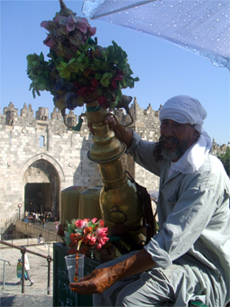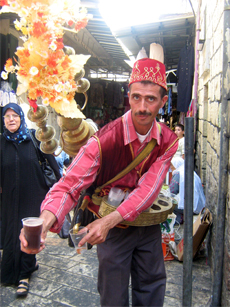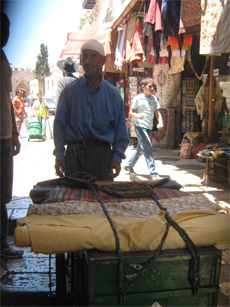 Carob Juice Vendor outside of Damascus Gate, Old City of Jerusaelm. [Note: The man in the photo was not interviewed.] Photo by Rhonda Spivak.
|
One of the basic premises in the Middle East peace process is that Palestinians desperately want to be of rule by Israel and to live in a state of their own.
But this past summer, when in Jerusalem I repeatedly interviewed East Jerusalem Arabs -those who lived in neighborhoods that would form part of a Palestinian capital of East Jerusalem if there ever were an accord. But a majority of those I spoke to told me clearly that they preferred to live in Israel rather than in a Palestinian state. Those I interviewed were all men-who would presumably have influence in their family units.
A couple of them even chuckled or laughed out loud when I suggested I naturally thought that they would prefer to live under PA rule, rather than Israel. A couple of them even lived in the neighborhood of Beit Hanina in East Jerusalem, the same neighborhood where Israeli Prime Minister Salam Fayyad lives.
I reported on these findings in two articles that are reprinted at the bottom of this article or can be accessed by clicking here: clicking here.
One of the Palestinian men I interviewed said something I will never forget, “Fayyad. I know where he lives. He lives in my neighborhood. But I don’t want him as my Prime Minister. Obama wants him to be my Prime Minister, but I don’t.”
This East Jerusalem Arab man went on to speak about how he believed the PA was corrupt and out to benefit themselves more than their people.
This is why a new poll of the Arabs of East Jerusalem which was designed and supervised by former State Department Middle East researcher David Pollock caught my eye immediately. It confirms exactly what I reported, even though this is something that has not often been reported: more Arabs of East Jerusalem actually would prefer to be citizens of Israel than of a Palestinian state.
There is also another finding that is significant: According to the poll,More than 40 percent of East Jerusalem Arabs said that even if Israelis and Palestinians signed a peace deal and East Jerusalem became the capital of a new state, some Palestinian militants would certainly or probably continue an armed struggle against Israel. This, of course, is what many Israelis, who are reluctant to cede the West Bank and East Jerusalem fear.
The poll, conducted in November 2010, http://pechterpolls.com/?p=508 is no doubt an embarrassment to Palestinian political leaders, and is something that pro-Palestinian journalists are not likely to report. After all, Palestinian leadership has been insisting that Israel must stop building new apartments in East Jerusalem-in effect giving up any claim to it as a precondition for the resumption of peace negotiations.
Pollock’s survey, found that only 30 percent of East Jerusalem Arabs [who number about 270,000] said they would prefer to be citizens of Palestine in a two-state solution, while 35 percent said they would choose Israeli citizenship. (The rest said they didn’t know or refused to answer.)
The. Arabs that want to stay prefer Israel’s jobs, schools, health care and welfare benefits to those of a Palestinian state, and their Palestinian nationalism is not strong enough for them to set aside these advantages in order to live in Palestine. The East Jerusalemites in the poll do say that they suffer from discrimination in Israel, but many like enough aspects of Israel that they would prefer to stay.
When asked if they would move to a different location inside Israel, if their neighborhood became part of Palestine, 40 percent said they were likely to move to Israel, and 37percent said they will not move. In comparison, 27 percent said they are likely to move to Palestine if their neighborhood became part of Israel, and 54 percent said they will not move.
“Quite clearly there is a discrepancy between people’s attitudes and the assumption that Palestinian neighborhoods should be part of Palestine,” Pollock, a senior fellow at The Washington Institute told the Washington Post. Pollock’s work was sponsored by Pechter Middle East polls in partnership the Council on Foreign Relations. “That’s not actually what the people want.”
Pollock told Ha’aretz, “I assume the Palestinian leadership wouldn’t be too happy about the results, but he said,”I think the results are very credible and solid.”
Pollock said he felt “the main reason so little attention was paid to the opinion of people living there is because people were nervous to find answers to these questions.”
“The Palestinian leadership might have been nervous because they understood these Palestinians have special benefits and interests not to lose these benefits,” Pollock added, saying that “from an Israeli point of view – people are more interested in the political significance of the city than perceptions of the Palestinians who live there.”
“Neither side had obvious short term interests in finding out what was under the surface,” he added.
When asked to provide the top reasons they chose one citizenship over the other, those who chose Israeli citizenship stressed freedom of movement in Israel, higher income, better job opportunities and Israeli health insurance. (Although freedom of expression is not listed a number of Palestinian Arabs mentioned this factor in my interviews with them.)
“A Palestinian expert and colleague of mine… accepts the results and takes it as a signal that the Palestinian Authority must convince more Palestinians that they can provide employment opportunities and services as well as Israel can – it’s a practical kind of challenge,” Pollock told Ha’aretz.
Field work for Pollock’s poll was conducted in November 2010 by a West Bank based Palestinian Polling Firm, Palestinian Centre for Public Opinion headed by Dr. Nabil Kulali, using in-home face to face interviews with a representative sample of 1039 East Jerusalemites. Pollock told Ha’aretz that he was in Jerusalem in November 2010 to supervise the results and was “confident” in them.
Those who chose Palestinian citizenship referred to nationalism and patriotism. Both groups, in each possible scenario, expressed concern over the possibility of losing access to the Al Aqsa Mosque because it’s unclear where the permanent border will be.
Among other concerns about becoming Palestinian citizens that respondents cited were losing access to jobs and free movement in Israel, losing government provided health care, unemployment and disability benefits, and municipal services.
Those who chose to be Israeli citizens are concerned about discrimination, obstacles to receive building permits, problems with visiting relatives and friends in Palestine, and possible moral misconduct of the kids.
About 56 percent of East Jerusalemites said they traveled inside Israel at least once a week; 60 percent said access to its Mediterranean beaches was “very important” or “moderately important” to them. [Note: Of course, there are beautiful beaches in Gaza, but presumably very few East Jerusalemite Arabs would give up their liberties and benefits to go to a beach in a Hamas run state].
The poll also shows East Jerusalem Arabs are pessimistic about the current peace process. Fully 64 percent said it was very likely or somewhat likely that if the current negotiations collapse, there will be a new intifada, by Palestinians, including those in Jerusalem.
Many East Jerusalem Arabs are middle class by Middle Eastern standards — 44 percent of those surveyed had household incomes of more than $1,300 per month. Broadly, they resemble Israel’s Arab citizens, who have also been shown in polls to prefer remaining in Israel rather than joining a Palestinian state
Dr. Pollock also told Ha’aretz, that from Israel’s point of view, the results send a mixed message.
“.. on the one hand for the Israelis who’d like to keep these neighborhoods forever it’s probably a pleasant surprise that a high percentage of Palestinians are willing to accept that.”
However, he added, “on the other hand around half of the Palestinians in East Jerusalem perceive that they are subject to significant amount of discrimination.”
The Israeli government “should decide if they are indeed willing to integrate 270 thousand Palestinians,” Pollock added.
“There is a real discrepancy between what policy-makers here, in Israel and in the territories assume about the Palestinians of East Jerusalem and what they actually want. I think that everyone – Israelis, Palestinians, other Arabs – should pay attention to these results,” Pollock said.
Interestingly enough, on some websites that have followed this story, individuals are writing that there ought to be a referendum in East Jerusalem to find out what East Jerusalem Arabs really prefer.
What follows are excerpts from the articles I wrote after interviewing East Jerusalem Arabs.
EAST JERUSALEM ARABS TELL ME THEY PREFER ISRAEL OVER THE PA
by Rhonda Spivak, June 29, 2010
JERUSALEM, ISRAEL – Although few would say so publicly, every one of the handful of East Jerusalem Arabs I spoke with in the last two weeks said that he would rather live under Israeli sovereignty than under Mahmoud Abbas’s Palestinian Authority.
In the Arab market in the Old City of Jerusalem, I met Asem, who sells soccer jerseys and sports wear. In his shop, there is a soccer jersey with the name PALESTINE in big letters on a blue background. Asem tells me there is no national soccer team for PALESTINE, but “but we have the shirt.”
But, although he sells a soccer jersey saying PALESTINE, Asem is in no rush to have East Jerusalem become the capital of a Palestinian state under PA President Abbas. When I ask him if he would prefer to live under Abbas in a state of Palestine, rather than under Israeli sovereignty, he gives me the opposite answer of what I expected.
“No, I would rather live under Israelis than under Abbas. Abbas is a thief like Arafat was. But I would rather have Abbas than King Abdullah.”
When I ask him why he prefers to stay under Israeli rule than PA rule, he answers, “At least here I can say what I want. In Syria, if you say what you want, you can go missing forever. In Jordan too. And under Abbas, too. It is chaos there [under PA rule]. Abbas can stay in Ramallah, and stay out of Jerusalem.”
Asem’s Palestinian friend in the shop nodded in agreement. Asem did say that it’s not that he liked Israel per se, but that if given the choice, he prefers it to being ruled by the PA.
He continued, “There are some nice homes in Ramallah. You know who lives in them. Abbas and his people. Not all of the other Palestinians. They are kept poor.”
Akram, a taxi driver living in Wadi Joz in East Jerusalem echoed Asam’s sentiments in wanting to remain under Israeli instead of Palestinian rule.
“Abbas, he should stay in Ramallah and not come to Jerusalem. We don’t need him here. We are different than Palestinians in Ramallah and elsewhere. They [the PA] are all “mamzerim’[bastards] and corrupt. I want to be Israeli. I have my Israeli identity card and I want to get my bituach leumi [national insurance benefit]. Who knows what it would be like to live under PA rule? But I don’t want to try it.”
Wadi Joz is a neighborhood where religious Jews have been trying to buy homes.
“There are Arabs who will sell for a lot of money but they do it quietly so no one will know. They make the deal but they make the possession date a long time away,” says Akram, who is pleased to tell me that his brother is entering the Israeli police force.
Moussa, a taxi driver waiting outside the Western wall tells me his name is “Moshey,” which is the Hebrew name for Moussa. Moussa is also definitive that he doesn’t want East Jerusalem to be a capital of a Palestinian state under Mahmoud Abbas. “It’s a balagan there in the West Bank [under Abbas]. I would keep my Israeli identity card…Baruch Hashem, I should live under the Israelis… It wouldn’t be better under Abbas.”
When Moussa says the words “ Baruch Hashem”, I can’t quite believe my ears. Did I hear you correctly saying Baruch Hashem, just like religious Jews do? Moussa smiles. “Yes, I speak like everyone else around here. I guess I picked up the expression.”
Firas, an Arab, who lives in Jerusalem’s Abu Tor neighborhood also says he isn’t in any rush to be under the PA, and is fine with the fact that there are “both Jews and Arabs who live in Abu Tor.”
“Who knows what kind of State there will be under Abbas. All my life I’ve lived under Israeli rule, so I don’t know anything else. But I don’t think my life would be better under the PA,” he says
IT HAPPENED AGAIN: MORE EAST JERUSALEM ARABS TELL ME THEY PREFER ISRAEL OVER THE PA
By Rhonda Spivak, July 20, 2010
JERUSALEM, ISRAEL-On June 29, 2010 I wrote an article “EAST JERUSALEM ARABS TELL ME THAT THEY PREFER ISRAEL OVER THE PA” which has since been picked up by four other websites. (see for example,http://cnpublications.net/2010/07/01/ )
When I was recently back in Jerusalem, I spoke with more East Jerusalem Arabs, all of whom told me the same thing: they do not want to live in a Palestinian state under Palestinian Authority’s Mahmoud Abbas but want to stay in Israel.
One younger man, who is part of a family clan of “30,000 ” East Jerusalem Arabs, who live” in Beit Hanina, Shuafat, and the Mount of Olives” told me that he does not want to live under the PA. “What you want me to starve of hunger,” he laughed. Seriously, he said that most of his clan of 30,000 “thinks the same way I do.”
He added “I live in Israel. I have paid my taxes all my life. I should get to stay. We aren’t going to the PA.”
Another middle aged East Jerusalem Arab living in the Mount of Olives said his family wants to stay under Israeli rule. I challenged him saying that before 1967 his family was living in Jordan, and if there were to be a Palestinian state with a capital in East Jerusalem his family would be in that state.
“I don’t care if years ago we were under Jordanian rule. We want to stay in Israel,” he said adamantly.
Another middle aged man and his friend concurred. “There are lots of those in East Jerusalem who want to live in a Palestinian state, but I am not one of them,” he said. “And there are lots like us,” he added.
One East Jerusalem Arab from Beit Hanina, who lives near Salam Fayyad, the PA president, said “Fayyad is a good man, but I wouldn’t want to live in his state.












